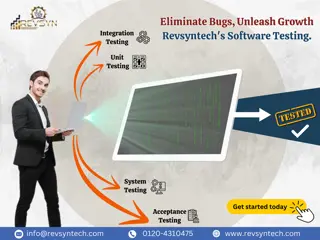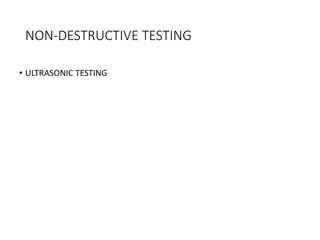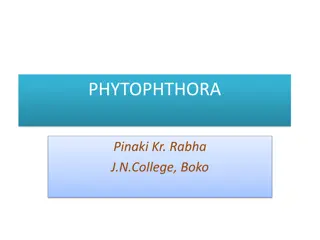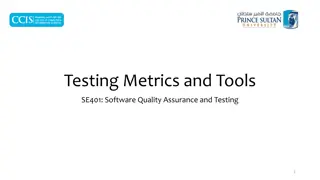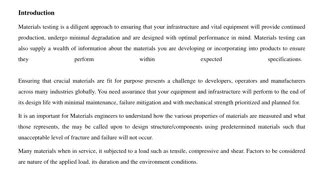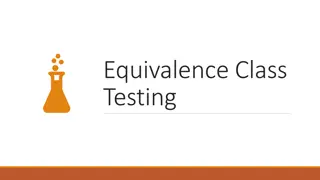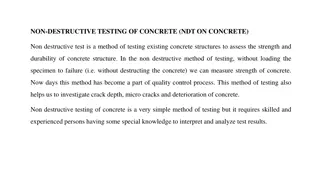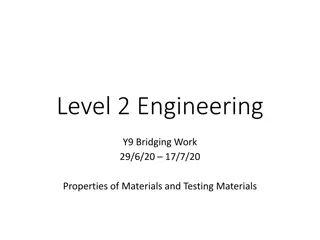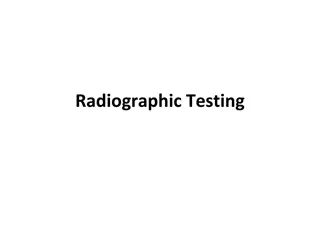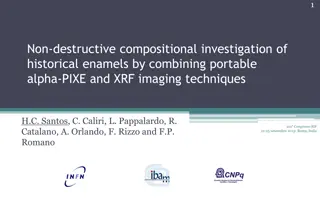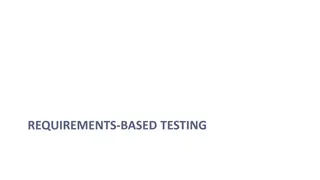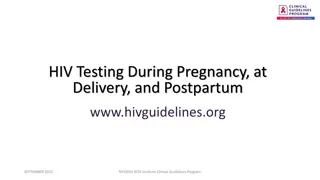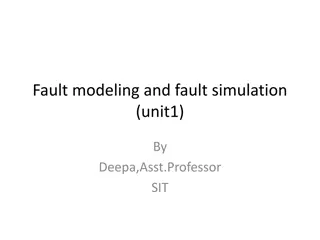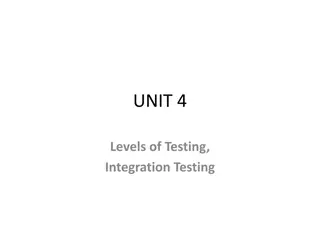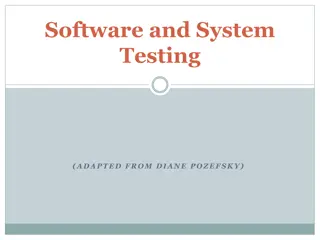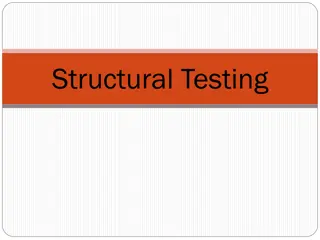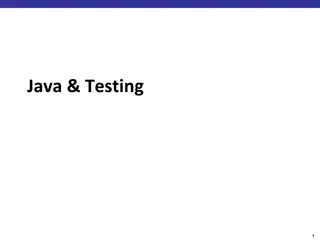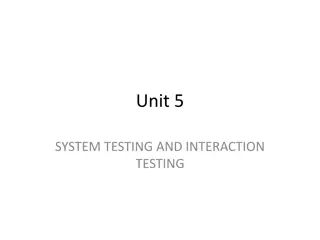Eliminate Bugs, Unleash Growth Revsyntech's Software Testing.
Unit Testing\nIntegration Testing\nSystem Testing\nAcceptance Testing\nEliminate Bugs and unleash Growth of Revsyntech's Software Testing.
2 views • 1 slides
Comprehensive Guide to Ultrasonic Testing (UT) in Non-Destructive Testing
Ultrasonic Testing (UT) is a crucial non-destructive testing method utilizing high-frequency acoustic waves for flaw detection, dimensional measurements, material characterization, and more. This guide covers the basic principles, types of sound waves, ultrasonic transducers, test techniques, applic
2 views • 35 slides
Constructive and Destructive Waves in Geographical Context
Exploring the characteristics of constructive and destructive waves in geography. Learn how waves are formed, what happens when they reach the coast, and their impact on the coastal environment. Dive into the dynamics of wave movement and the distinctions between constructive and destructive waves.
0 views • 10 slides
Exploring Wave Interference in Physics: Superposition, Constructive, and Destructive Interference
Delve into the fascinating world of wave interference in physics, from understanding the concept of superposition to identifying constructive and destructive interference patterns. Discover how light waves interact through different paths and sources to create coherent or incoherent light. Explore t
2 views • 37 slides
Phytophthora: Destructive Plant Pathogen
Phytophthora is a destructive plant pathogen that infects various crops, causing symptoms like leaf lesions and rotting tubers. Its somatic structure includes profusely branched hyphae, and it reproduces asexually through zoospores. The germination process involves the spread of spores by wind and w
2 views • 21 slides
Software Testing Metrics and Tools
Software testing metrics play a crucial role in evaluating the quality and progress of the testing process. Metrics provide valuable insights into the readiness, quality, and completeness of a product. By measuring attributes such as defects, testing efficiency, and productivity, organizations can m
4 views • 100 slides
Fundamentals of Software Testing Explained
Software testing is a critical process to ensure that software applications meet requirements and are free of defects. It involves various activities such as test planning, analysis, design, implementation, and execution. Testing approaches like the Bing bang approach and Total Quality Management ar
1 views • 48 slides
The Importance and Methods of Materials Testing
Ensuring materials in infrastructure and equipment meet performance standards is crucial for sustainable production. Materials testing, encompassing destructive and non-destructive methods, provides valuable insights into material properties. From tensile to compression tests, understanding stress a
5 views • 28 slides
Equivalence Class Testing and Its Application in Software Testing
Equivalence class testing is a software testing technique that involves dividing input values into classes for effective testing coverage. Equivalence classes are defined mathematically as subsets of a given set, ensuring partitioning and mutual exclusivity. By applying equivalence partitioning, tes
3 views • 21 slides
Uganda's Successes in Reaching Men with HIV Testing Through Assisted Partner Notification Program
Uganda has successfully implemented an Assisted Partner Notification (APN) program to reach men for HIV testing, addressing the gender gap in testing rates. By utilizing various approaches such as index testing, self-testing, and social network testing, Uganda has achieved significant success in tar
0 views • 12 slides
Importance of Non-Destructive Testing in Concrete Structures
Non-destructive testing (NDT) of concrete plays a crucial role in assessing the strength, durability, and quality control of structures. This method involves assessing properties such as density, strength, crack depth, and reinforcement location without damaging the concrete. NDT is essential for ve
0 views • 5 slides
Software Testing Foundation Level: Testing Throughout the SDLC Quiz
Explore key concepts in software testing throughout the Software Development Lifecycle (SDLC) with a quiz covering topics like white-box testing in acceptance testing, component testing vs. system testing, and regression testing purposes. Enhance your understanding of testing methodologies with samp
5 views • 17 slides
Importance of Software Testing in Preventing Catastrophic Failures
Software testing is crucial in ensuring the reliability and safety of software systems, as highlighted by catastrophic failures such as the Ariane 5 rocket incident and the Therac-25 radiation therapy machine disasters. These examples underscore the importance of thorough testing in identifying and
1 views • 42 slides
Computer Viruses: Types, Prevention, and Top 5 Destructive Viruses
Computer viruses are malicious software programs that can cause significant harm. Learn about different types of viruses, symptoms of infection, stages of a virus, prevention measures, and the top 5 most destructive viruses of all time.
0 views • 11 slides
Testing Approach in SCREAM for E3SM Fall All-Hands 2019
Major effort is focused on verification and testing in SCREAM for the E3SM Fall All-Hands. The initiative includes unit testing, property testing, regression testing, and leveraging various tools like Cmake, Python, Jenkins, AutoTester, and GitHub for Continuous Integration (CI). The emphasis is on
1 views • 21 slides
Evolution of Acoustic Emission Testing: From Ancient Pottery Makers to Modern Industry
Acoustic Emission (AE) testing has a rich history dating back to ancient times when pottery makers listened for structural failures in their ceramics. Over the years, AE evolved through various experiments, leading to its industrial application in aerospace, nuclear reactors, and more. Today, AE is
0 views • 31 slides
Europe Non-Destructive Testing Services Market Size Analysis 2023-2033
The Europe non-destructive testing (NDT) services market is estimated to reach $9.28 billion by 2033 from $6.65 billion in 2023, at a growth rate of 3.39% during the forecast period 2023-2033.\n\nRead Report Overview: \/\/bisresearch.com\/industry-re
1 views • 3 slides
Nuclear Non-Proliferation Treaty Compliance Measures Overview
Detailed overview of the measures implemented for verifying states' compliance with the Nuclear Non-Proliferation Treaty (NPT), including design verification, analysis of declarations, on-site inspections, assay of nuclear materials, and containment/surveillance techniques. The process involves dest
0 views • 9 slides
Material Properties and Testing in Engineering
Explore the essential properties of materials like tensile strength, hardness, toughness, malleability, ductility, conductivity, and more in the field of engineering. Delve into the specific requirements for structural, mechanical, and electronic products while learning about destructive and non-des
0 views • 4 slides
Liquid Penetrant Testing: Methods, Advantages, and Applications
Liquid Penetrant Testing (PT) is a non-destructive testing method used to detect surface flaws in various materials. This method involves applying a colored or fluorescent dye to the surface, revealing any defects through capillary action. PT is widely used due to its effectiveness in detecting crac
1 views • 21 slides
Radiographic Testing: History, Science, and Radiation Safety
Exploring the history and science behind Radiographic Testing (RT), from the discovery of X-rays to the development of methods using gamma radiation. Learn about the terminology, natural radiation, and the characteristics of radiation in various forms. Understand the importance of safety measures in
0 views • 47 slides
Testing in Software Engineering
In the previous session, we discussed various aspects of software engineering, including modeling with UML diagrams, such as activity diagrams, use case diagrams, sequence diagrams, state diagrams, and class diagrams, as well as architecture patterns. Testing was emphasized as a key aspect, highligh
0 views • 35 slides
Gray Box Testing in Software Development
Gray Box Testing is a software testing technique that involves testing the software with partial knowledge of its internal workings. It combines aspects of White Box Testing and Black Box Testing, allowing testers to check both the presentation layer and the code part of an application. Gray Box Tes
0 views • 14 slides
Non-Destructive Investigation of Historical Enamels Using Portable Alpha-PIXE and XRF Techniques
The study presents a non-destructive compositional investigation of historical enamels from the XI-XII century by combining portable alpha-PIXE and XRF imaging techniques. The research explores the use of these techniques to characterize the glass matrix, identify colorants and opacifiers, and asses
0 views • 15 slides
Innovative Non-Destructive Testing Solution for Infrastructure Corrosion Assessment
InspecTerra offers advanced non-destructive testing solutions for infrastructure asset assessment, focusing on corrosion detection in ferromagnetic objects. Their iCAMM technology is portable, highly sensitive, and unaffected by environmental conditions, providing accurate and cost-effective inspect
0 views • 4 slides
Requirements-Based Testing in Software Development
Dive into the world of requirements-based testing in software development, exploring main concepts, test levels, testing roles, and the importance of testing your solution and modeling case. Learn about test cases, different testing activities, and the significance of acceptance testing in identifyi
0 views • 16 slides
Guidelines for HIV Testing During Pregnancy and Postpartum
These guidelines recommend HIV testing during pregnancy, at delivery, and postpartum. Testing should be done early in pregnancy and again in the third trimester. Expedited testing during labor is required for certain patients, and syphilis testing is recommended. Pre-exposure and post-exposure proph
0 views • 18 slides
Two-Source Interference Patterns
Dive into the fascinating world of two-source interference patterns with the superposition principle, constructive and destructive interference concepts, and demonstrations illustrating how overlapping waves interact. Explore scenarios like people talking simultaneously and ripples on a pond to gras
0 views • 31 slides
Comprehensive Overview of Fault Modeling and Fault Simulation in VLSI
Explore the intricacies of fault modeling and fault simulation in VLSI design, covering topics such as testing philosophy, role of testing in VLSI, technology trends affecting testing, fault types, fault equivalence, dominance, collapsing, and simulation methods. Understand the importance of testing
0 views • 59 slides
Unit Testing in Software Engineering
Concept Software is a discipline comprising various code pieces. Testing these codes together is complex but vital in Software Engineering. The process includes early testing like unit tests, pairwise/multiple component testing, module testing, integration testing, user tests, alpha tests, beta test
2 views • 6 slides
Integration Testing and Levels of Testing
Explore the importance of integration testing in software development, covering topics such as traditional testing levels, the SATM system, goals and purposes of integration testing, testing level assumptions and objectives, software process overview, various approaches to integration testing, and t
0 views • 39 slides
Best Non Destructive Training Institute in Hyderabad
You can pursue this course if you have passed just inter (10 2), Diploma or B. Tech., B. E., M. Tech. or even MBBS. Join TWG International today for course on Non Destructive Testing. https:\/\/tinyurl.com\/nrc3hcnk
3 views • 9 slides
Importance of Software and System Testing
Understanding the critical role of software and system testing in identifying and fixing errors before they lead to major failures. Various types of testing such as functional, usability, performance, and reliability testing are essential to ensure the quality of software products. Different classif
0 views • 52 slides
Constructive & Destructive Forces
The impact of constructive and destructive forces on Earth's surface through examples like volcanoes, earthquakes, erosion, and more. Discover how mountains form, how earthquakes are measured, and the effects of erosion on landscapes. Learn about the Ring of Fire and the movement of tectonic plates
0 views • 10 slides
Understanding Structural Testing in Software Development
Structural testing, also known as white-box testing, involves deriving test cases directly from the source code to ensure all statements are covered, dependencies in program variables are tested, and all paths are satisfactorily tested. Control flow testing and data flow testing are essential compon
0 views • 30 slides
Understanding Java Testing and Types of Testing Methods
Explore the importance of testing in Java development, learn the difference between testing and debugging, understand various types of testing such as unit testing and system testing, and discover manual and automatic testing approaches. Dive into the world of black box and white box testing methods
0 views • 18 slides
Software Testing Techniques and Frameworks
This content delves into various software testing techniques and frameworks used in software development cycles, emphasizing the importance of requirement-based blackbox testing and logic-based whitebox testing. It covers topics such as black-box testing, white-box testing, SW reliability, model che
0 views • 29 slides
Effective Strategies for System Testing and Interaction Testing
Explore the key concepts of system testing and interaction testing, including requirements specification, finding threads, testing strategies, system testing guidelines, and examples like ASF testing. Learn about interactions, client/server testing, device ports, event handling, and more to ensure e
0 views • 60 slides
Wave Interference and Applications in Light Waves
Explore the concepts of superposition principle, interference, constructive and destructive interference, their visual representations, and applications in light waves. Learn how interfering light waves create colors in soap bubbles due to constructive and destructive interference. Discover the fasc
0 views • 20 slides
Functional Testing Strategies with Mock Objects and Test Environments
Explore the world of functional testing with mock objects, test responsibilities, and various testing environments. Learn about the importance of unit testing, system testing, and production testing. Discover how mocking dependent services can enhance your testing process and the modes of communicat
0 views • 31 slides
